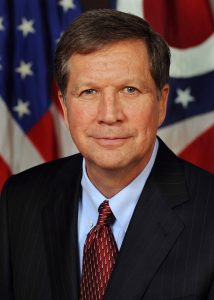
John Kasich has spent much of his life in the political sphere, serving in the Ohio Senate, the U.S. House of Representatives and most recently, as governor of Ohio.
He garnered national attention during the 2016 Republican presidential primary, where he was the last candidate to drop out before Donald Trump won the nomination.
Despite his political experience, Kasich’s 10:45 a.m. lecture today, July 1st, in the Amphitheater will focus on the power of the everyday person, as he kicks off Week Two: “Uncommon Ground: Communities Working Toward Solutions.”
“What we have to realize is that the real power that exists in our country comes from individuals,” he said. “Most of the change we have comes from the bottom up.”
Matt Ewalt, vice president and Emily and Richard Smucker Chair for Education, said Kasich will open the week “by reminding us, as he has throughout his decades of service, of the power of individuals to make a difference, that power comes from communities.”
Kasich pointed to protests in Hong Kong, the Czech Republic and Venezuela as recent examples of regular people making a difference.
“People are fed up and they want to be heard,” Kasich said. “This is a good development, I believe, in the world.”
Elected leaders are important and have a lot of influence when it comes to things like war and immigration policy, Kasich said, but when it comes to the day-to-day, everyday people have the greatest impact.
“The power lies in communities,” he said. “It does not really lie in waiting for congressmen or senators.”
In his lecture this morning, Kasich will provide examples of everyday people who have made positive impacts in their communities, as well as ways Chautauquans can make change in their own worlds.
The topic is similar to what he will cover in his forthcoming book, It’s Up to Us: Ten Little Ways We Can Bring About Big Change.
Every individual can make a positive impact in their own way, Kasich said. It could be as simple as comforting a sick neighbor or having integrity within their profession.
In January, Kasich finished his eight-year tenure as governor of Ohio; his governorship was characterized by changes to healthcare, abortion access and taxes.
Although Kasich called for a repeal of the Affordable Care Act in 2014, he pushed to expand Ohio Medicaid to cover low-income, childless adults. Hundreds of thousands of Ohio residents signed up for Medicaid after the change.
Kasich took steps to address the opioid crisis in Ohio, holding doctors who over-prescribed painkillers accountable and improving the state database that tracks prescriptions.
While in office, Kasich privatized operations in some state prisons, including outsourcing prison food operations; signed abortion restriction bills into law, causing the closure of half of the abortion clinics in Ohio; and cut income taxes by 16%.
Kasich has been highly critical of Trump, often commenting about the president on national media. Kasich became a CNN political commentator in January.
Additionally, he has kept busy writing his book and giving speeches.
“I’m having a great time; I’m really enjoying my life now,” he said. “It’s great.”
He hopes his lecture at the Institution will help inspire people to do what they can to better their communities.
“People think, ‘change the world? How am I going to change the world?’ ” he said. “It’s possible to change it in big ways and it’s possible to change it in smaller ways, but I think big and small is not really the issue. It’s doing something to make the world better.”




